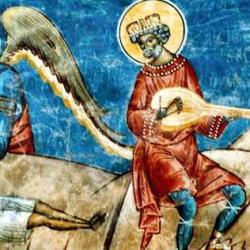Psalm 103:1 is a small chiasm that hints at large anthropological conclusions:
A. Bless Yahweh
B. O my soul
B’. All that is within me
A’. [Bless] His holy name.
Though the verb “bless” is not repeated in the final clause, it is implied. Yahweh and “holy name” are clearly parallel. Yahweh and His Name enclose the soul of the Psalmist. What intrigues me at the moment is the B/B’ connection. Initially, it is David’s soul that blesses Yahweh; then it is “all within.” That shows that the “soul” is parallel to, if not identical with, “all within.” This has implications in a couple of directions.
First, if we can press the parallel, we might be able to say that the soul is what is within. What do you have within you? The Psalmist answers, My soul. “Soul” names the whole of my interior life. But then we can add the observation that in Scripture the soul is not primarily intellectual but appetitive. Souls desire, long for, yearn, hunger, and thirst. If “soul” names everything in me, then (at least perspectivally) my interior life is a life of desire. At my “heart” I am my desires.
Second, this verse seems to have some import for our understanding of the sacrificial system. In all the animal sacrifices, the portions of the animal that are brought near ( qarab ) to Yahweh are the inward parts ( qereb ). Here, David blesses Yahweh with his soul, all that is within ( kal-qarebaw ), all his inner parts. This verse supports the notion that the fat and inner organs that are offered to Yahweh represent the worshiper offering his innermost soul, his loves and desires, to Yahweh, so that they might be transfigured to smoke.















